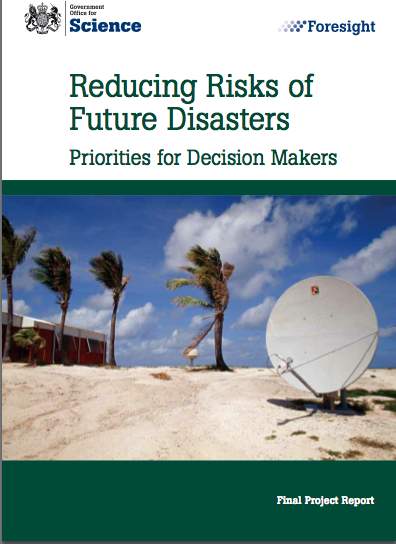GfGD welcomes the release of the UK Government Office for Science Foresight Report into “Reducing the Risks of Future Disasters: Priorities for decision makers”. The report has been specially commissioned to recognise the growing need for good disaster and risk reduction (DRR) science.
The report describes how the growing threat of natural hazards to increasingly vulnerable communities worldwide can be lessened using better processes of decision making, through the integration of information provided by scientific developments. This course of action will subsequently save lives and resources in developing countries.
Over the next 30 years the risk of disasters is expected to increase as a result of amplifying factors, primarily expanding populations in high-risk regions and a warming climate. Through strategic investment in scientific research, we can expect to improve our ability to predict, understand and manage hazards.
We support the decision by the UK Government and Department for International Development to invest in developing and improving this field through the production of this report. We are particularly encouraged by the report’s focus on the improved use of science and evidence within disaster and risk reduction; it is important that the latest geoscientific knowledge on hazards is understood by policy makers, especially in developing countries where populations may be more vulnerable. At the same time, we feel it is prudent to recognise the limitations and uncertainties of DRR science and to ensure we are sensitive to and inclusive of indigenous knowledge.
We feel that for hazards research to move forward effectively, we need to strengthen communication between scientists, policy makers and the affected communities. In light of the recommendations in the Foresight report, we offer some thoughts on how communication can be best fostered:
- There is a need for training in the communication of science to include multi-disciplinary and cross-cultural approaches.
- Exchange and overlap between geoscientists and development practitioners should continue to be encouraged.
- Undergraduate and Master’s courses should work to place natural hazards into a wider context
You can read our official response to the report from our advocacy team, and read a summary of our response in our press release.
We also hosted a twitter discussion about the report, which has been documented using storify. Our discussion focused on the meaning of some of the terms in the document: vulnerability, hazards and disasters, which are often misused. We also asked broad questions that we have to address following of the Foresight report’s findings: What kinds of collaborative efforts can you see happening in the next 20 years relating to DRR? Do you think scientific literacy on vulnerability is increasing? What can GfGD do to enhance this? How ready are the scientific community to incorporate local and indigenous knowledge into their work, hazard analysis and hazard assessments? Is this valued and used currently, and if not why not? We welcome your continued contributions to this discussion through twitter, facebook or blog post comments.
We believe that geoscience can make a significant contribution to DRR. Further steps need to be taken to ensure that the scientific tools and models being developed can be used to their best effect by other stakeholders. Geology for Global Development will be working to play their full part in addressing these challenges, and preparing young geoscientists to contribute to DRR.
———–
The full report can be accessed here:
An executive summary of the report can be accessed here:
Our official response:
GfGD Foresight ‘Reducing Risk of Future Disasters’ Response
Our press release:
http://www.gfgd.org/home/news/press-releases
Our storify documenting our twitter discussion:
storify.com/GfGDComms/gfgd-twitter-discussion-on-foresight-report#publicize

